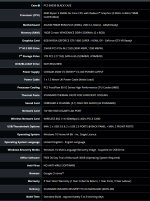Booting up a new PCS PC for the first time. Opens up the BIOS. I press F10 to save and exit (Message says no changes have been made), then PC tries to boot, but get to the media check, can't find any, so aborts and returns to BIOS. I trid F7 for Advanced configuration but I don't know what is correct so I'm unhappy saving in case I make things worse.
You are using an out of date browser. It may not display this or other websites correctly.
You should upgrade or use an alternative browser.
You should upgrade or use an alternative browser.
New PC. Won't get past BIOS
- Thread starter Jimikuk
- Start date
BlessedSquirrel
We love you Ukraine
Hiya, can you post your full specs from the order page?Booting up a new PCS PC for the first time. Opens up the BIOS. I press F10 to save and exit (Message says no changes have been made), then PC tries to boot, but get to the media check, can't find any, so aborts and returns to BIOS. I trid F7 for Advanced configuration but I don't know what is correct so I'm unhappy saving in case I make things worse.
BlessedSquirrel
We love you Ukraine
Try removing and reinstalling the primary M2 drive, then try booting again.
BlessedSquirrel
We love you Ukraine
It's a custom PC, they're not the same as an off the shelf product, you'll need to learn how to troubleshoot general OS and hardware issues.Wouldn't have a clue how to do that. I wouldn't have thought I should have to do anything. It's a brand new PC.
Stuff often comes loose in shipping, there's nothing you can do to avoid that, it's just the nature of shipping sensitve electical equipment across the country and across europe. Boxes get dropped, knocked, it's just the way it is.
Also, don't get confused between something like a Dell and a custom PC, they're entirely different products. Dell makes their own motherboards, so they can write specific drivers, the motherboards often have proprietary connectors, often smaller form factor. But because of this, they just are more stable because they're built around a tiny portion of 3rd party hardware, often drives are soldered on as well as CPU's so they don't come loose, PSU's are designed for that specific range. Custom PC's have to be compatible with hundreds if not thousands of 3rd party components, drivers are often less reliable, all components are interchangeable. You have to troubleshoot more often than on an off the shelf.
The bonus is you get more selection over specific components related to your needs, usually far more powerful at the same pricepoint as well and so long as its well designed, it will take any upgrades you like which you can't do on an off the shelf system
Last edited:

